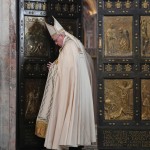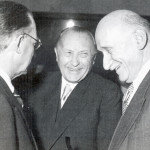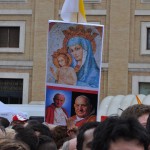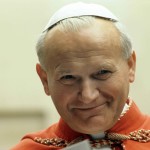Thirty years ago, to celebrate the Year of the Family, Pope John Paul II wrote a Letter to Families. The Pope stressed that the family is “the way of the Church” and that “the future of humanity passes by way of the family”. He was also well aware that today, also in Europe, it is very difficult for families to fulfil their tasks properly.
Papal theology of marriage and family is developed according to the “pedagogy of Jesus.” Asked by the scribes, if the husband can put his wife away, Christ avoids casuistic case studies and goes straight to the essence of the matter. He explained the God’s original intention for marriage, what was “in the beginning”. Withdrawal from the original plan of God is the result of the “hardness of heart”. Sklerocardia, i.e. the pagan heart, causes that the Israelites begin to look for casuistic justification of the pagan practice of “putting wife away”.
Following the “pedagogy of Jesus” papal lecture focuses on some verses of the Book of Genesis, accompanied by the Council’s teaching that man is the only creature on earth which God willed for itself and that he cannot fully find himself except through a sincere gift of himself. “To love means – writes John Paul II – to give and to receive something which can be neither bought nor sold, but only given freely and mutually. (…) The indissolubility of marriage flows in the first place from the very essence of that gift: the gift of one person to another person. (…) In their marital consent the bride and groom call each other by name: “I… take you… as my wife (as my husband) and I promise to be true to you… for all the days of my life”. A gift such as this involves an obligation much more serious and profound than anything which might be “purchased” in any way and at any price”. Conjugal love by its nature is fertile, tend to have children who are “at the image and likeness of God” but also at the image and likeness of their parents.
That reflection on the genealogy of the person seems to be one of the most profound texts of John Paul II. It shows the conception of each child as the result of close collaboration between the husband, wife and God, but also indicates the spiritual challenge faced by parents are moving slowly from the desire of the child “for themselves” toward the selfless love with which God surrounds every man – love “for itself”. Children have an important role to play in the history of conjugal love. Aristotle remarked, that where children are missing, people get divorced easier. So it is not clear if the current crisis of the family in Europe is the reason for the lack of children or if the lack of children is the source of the crisis and of the weakness of the families. The love story is always a story of a drama. We always love too little and too late. In the post-heroic modern culture we are faced with an attempt to de-dramatize human love. It sometimes seems that all the painful moments and all liabilities arising from the past can be erased from the memory as from the computer. John Paul II points out that family living in accordance with the moral standards make up “the norm”, despite the existence of more than a few “irregular situations”. Its testimony is playing an important role “so that the individual born and raised in it will be able to set out without hesitation on the road of the good, which is always written in his heart. Unfortunately various programs backed by very powerful resources nowadays seem to aim at the breakdown of the family. At times it appears that concerted efforts are being made to present as “normal” and attractive, and even to glamourize, situations which are in fact “irregular”. Indeed, they contradict “the truth and love” which should inspire and guide relationships between men and women, thus causing tensions and divisions in families, with grave consequences particularly for children”. The family task is to be a witness that loves in this world still is possible.
Trent’anni fa, per celebrare l’Anno della Famiglia, Giovanni Paolo II scrisse una “Lettera alle famiglie”. Il Papa sottolineava che la famiglia è “via della Chiesa”, e che “l’avvenire dell’umanità passa attraverso la famiglia”. Era ben consapevole che oggi, anche in Europa, è molto difficile per le famiglie assolvere i loro compiti correttamente.
La teologia del matrimonio e della famiglia del Papa si sviluppa secondo la “pedagogia di Gesù”. Quando gli scribi, chiedono se il marito può divorziare dalla moglie, Cristo evita divagazioni casistiche e si dirige dritto all’essenza della questione. Spiega l’intenzione originale di Dio per il matrimonio, ciò che era “in principio”. Il ritiro dal piano originale di Dio è il risultato di “durezza del cuore”. “Sklerocardia”, cioè il cuore pagano, provoca che gli israeliti iniziano a cercare in modo casistico di giustificare la pratica pagana di “allontanamento della moglie”.
Secondo la “pedagogia di Gesù” la lezione di papa Wojtyla si concentra su alcuni versetti del libro della Genesi accompagnati dall’insegnamento conciliare che l’uomo è l’unica creatura sulla terra voluta da Dio per se stessa, e che non può “ritrovarsi pienamente se non attraverso un dono sincero di sé”. “L’amore fa sì – scrive Giovanni Paolo II – che l’uomo si realizzi attraverso il dono sincero di sé: amare significa dare e ricevere quanto non si può né comprare né vendere, ma solo liberamente e reciprocamente elargire. Il dono della persona esige per sua natura di essere duraturo ed irrevocabile. L’indissolubilità del matrimonio scaturisce primariamente dall’essenza di tale dono: dono della persona alla persona. (…) Nel consenso matrimoniale i novelli sposi si chiamano con il proprio nome: ‘Io… accolgo te… come mia sposa (come mio sposo) e prometto di esserti fedele… per tutti i giorni della mia vita’. Un simile dono obbliga molto più fortemente e profondamente di tutto ciò che può essere ‘acquistato’ in qualunque modo e a qualsiasi prezzo. L’amore coniugale per la sua natura è fertile, tende ad avere figli che sono «all’immagine e somiglianza di Dio”, ma anche all’immagine e somiglianza dei genitori.
Questa riflessione sulla genealogia della persona mi sembra essere uno dei più profondi testi di Giovanni Paolo II. Mostra la concezione di ogni bambino come il frutto della intima collaborazione tra il marito, la moglie e Dio, ma indica anche la sfida spirituale che devono affrontare i genitori. Dal desiderio del bambino “per sé” si muovono lentamente verso l’amore disinteressato con cui Dio circonda ogni uomo. I bambini hanno un ruolo importante da svolgere nella storia dell’amore coniugale. Aristotele osservò, che dove mancano i bambini, le persone divorziano più facilmente. Quindi non è chiaro se l’attuale crisi della famiglia in Europa sia la ragione per la mancanza dei figli o se la mancanza dei figli sia la fonte della crisi e della debolezza delle famiglie.
Piotr Mazurkiewicz
Latest posts by Piotr Mazurkiewicz (see all)
- End of life: what is the true right? - 31 dicembre 2014
- Reflect on the fragility - 31 luglio 2014
- The value of marriage - 25 luglio 2014











